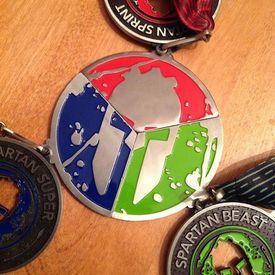Is it more expensive to eat healthy?
Replies
-
Strip away all the chips, cookies, sweets, "instant" foods (individually packaged oatmeal, rice mixes, granola bars, etc), sodas and frozen dinners (SmartOnes, HealthyChoice, LeanCuisine) and replace with fresh produce (lots of in season/on sale veggies and fruit), lean meats, good diary products and bulk dry goods (rice, beans, rolled oats, grits). In the long run, it is much healthier and cheaper.0
-
I have no studies to back it up, but I think living it is good enough. Yes, it costs more to eat healthy -- maybe not if you're making the switch from take-out three times a day, but if you're living on a tight budget, and you make the switch from canned food and cheap frozen dinners, yeah.0
-
Cooking and making most things from scratch will save tons of money! We buy bulk freeze most of it and I end up making about 75% of my meals. Vegetables can be pretty cheap too. We eat out once a week, and buy groceries once a week to every other week. I cant really say what my bill runs a week because it varies depending on what we need, but we do have a little money left over at the end of the month. It's worth it in the long run when you look at the health benefits. Here's a little study I pulled up.
Cost of eating: whole foods versus convenience foods in a low-income model.
McDermott AJ, Stephens MB.
Fam Med. 2010 Apr;42(4):280-4.
Abstract
BACKGROUND AND OBJECTIVES:
Financial limitations in low-income populations, those at highest risk for poor health outcomes, may preclude adherence to recommended dietary guidelines. We examine the financial burden of shopping for foods to meet national dietary recommendations in a supermarket compared to eating primarily in a fast-food restaurant.
METHODS:
Using a single-parent, low-income model, we obtained whole food costs (healthy) from local supermarkets and from fast-food outlets (convenient). Using cost per calorie as a metric for comparison, we used estimated single-parent, low-income living expenses to determine the relative costs of meeting national dietary guidelines.
RESULTS:
Average food costs for healthy and convenience diets accounted for 18% and 37% of income, respectively. Dairy products and vegetables accounted for the largest cost percentages of diet costs (36% and 28%, respectively). The cost per calorie of a convenience diet was 24% higher than the healthy diet. Both models resulted in net financial loss over the course of a year for a single-parent, low-income family.
CONCLUSIONS:
Food costs represent a significant proportion of annual income. Diets based heavily on foods from convenient sources are less healthy and more expensive than a well-planned menu from budget foods available from large supermarket chains.0 -
So I infer the following: if you are eating somewhat reasonable with frequent episodes of bad food, eating healthy might be cheaper. However, if you are eating mostly junk food, switching to healthy eating might be more expensive. Fish is pricey where I live and my preferred source of meat protein.0
-
I was spending a lot more money on boxed, pre-packaged foods than I am now even though I'm buying a lot more fresh produce.
I definitely agree with one of the previous posters that it is absolutely less convenient to eat healthy, both in the time spent cooking and the time I spend at the the grocery store. I have to go shopping at least once a week now that I'm buying fresh food instead of shelf-stable garbage. That said, I eat very little meat and if I were buying grass-fed beef or fresh fish, my grocery budget would probably be destroyed.0 -
So I infer the following: if you are eating somewhat reasonable with frequent episodes of bad food, eating healthy might be cheaper. However, if you are eating mostly junk food, switching to healthy eating might be more expensive. Fish is pricey where I live and my preferred source of meat protein.
Here, it's chicken. Four boneless, skinless chicken breasts cost me at least $12 or $13 on a good day.0 -
Personally, I don't think healthy is more expensive.
I bought a 5 pound bag of oranges for $3.49. A 12 oz bag of potato chips would cost about the same.
I also got boneless skinless chicken breasts for $1.99 a pound, frozen carrots for $.99 a pound, 10 pounds of potatoes for $3.99 (bogo special). That'll go a lot further than a couple McDoubles and fries. Anyone who thinks anything off the dollar menu is really a bargain needs to do some math and learn to cook.
Now, if you're talking about CONVENIENCE, that's another story.
I need to live where you do. In the UK, skinless chicken breasts in the supermarket are about $8.90/lb minimum and 10lb of potatoes would be about $4.80 minimum, usually more. But a box of 'chicken' burgers from the freezer would be about 75 cents for 8.
But still, I do agree that the heavily processed stuff isn't actually as cheap at it appears to be - and everyone needs to learn to cook.
But it's what is heavily marketed instore. And poorer people are less likely to be well educated or able to understand that it's anything but a healthy bargain that's being sold to them.0 -
I have no studies to back it up, but I think living it is good enough. Yes, it costs more to eat healthy -- maybe not if you're making the switch from take-out three times a day, but if you're living on a tight budget, and you make the switch from canned food and cheap frozen dinners, yeah.
Agree0 -
So I infer the following: if you are eating somewhat reasonable with frequent episodes of bad food, eating healthy might be cheaper. However, if you are eating mostly junk food, switching to healthy eating might be more expensive. Fish is pricey where I live and my preferred source of meat protein.
What do you consider "junk food"? Is that fast food? Or unhealthy food?0 -
Quality food IE: whole foods, health foods can run more. The trick is to prepare things yourself. Cut your own fruits and veggies, skip the sauces and all that - most are just calorie killers. I added about 10 percent to my budget because I like things like almonds. But you can save there too by shelling your own peanuts.0
-
So I infer the following: if you are eating somewhat reasonable with frequent episodes of bad food, eating healthy might be cheaper. However, if you are eating mostly junk food, switching to healthy eating might be more expensive. Fish is pricey where I live and my preferred source of meat protein.
I think this is pretty accurate, unfortunately. Although, I still think with planning and food preparation and buying bulk money could be saved.
Here's another study I found interesting. Note the last sentence.
Poverty and obesity: the role of energy density and energy costs.
Drewnowski A, Specter SE.
Am J Clin Nutr. 2004 Jan;79(1):6-16.
Abstract
Many health disparities in the United States are linked to inequalities in education and income. This review focuses on the relation between obesity and diet quality, dietary energy density, and energy costs. Evidence is provided to support the following points. First, the highest rates of obesity occur among population groups with the highest poverty rates and the least education. Second, there is an inverse relation between energy density (MJ/kg) and energy cost (US dollars/MJ), such that energy-dense foods composed of refined grains, added sugars, or fats may represent the lowest-cost option to the consumer. Third, the high energy density and palatability of sweets and fats are associated with higher energy intakes, at least in clinical and laboratory studies. Fourth, poverty and food insecurity are associated with lower food expenditures, low fruit and vegetable consumption, and lower-quality diets. A reduction in diet costs in linear programming models leads to high-fat, energy-dense diets that are similar in composition to those consumed by low-income groups. Such diets are more affordable than are prudent diets based on lean meats, fish, fresh vegetables, and fruit. The association between poverty and obesity may be mediated, in part, by the low cost of energy-dense foods and may be reinforced by the high palatability of sugar and fat. This economic framework provides an explanation for the observed links between socioeconomic variables and obesity when taste, dietary energy density, and diet costs are used as intervening variables. More and more Americans are becoming overweight and obese while consuming more added sugars and fats and spending a lower percentage of their disposable income on food.0 -
It is..kinda...
To get say 500 calories you can buy a $1 cheeseburger or $4 worth of veggies. Obviously you can bargain hunt and all that, but in general things like whole grain breads with low/no preservatives, heads of leaf lettuce and spinach, whole foods in general and milk/eggs will be more expensive than cheap and quick meals or cold cereal and the like.
Though if you know what you need and prep your own meals, it's usually about the same. I spend $15-$20 a week of veggies for lunch salads and fruit, maybe a gallon of milk and 12-18 eggs. Then I buy whole chickens when they're $1/lb and just cook them whole. I keep lots of meat frozen and slow cook it then use it for a week, and I budget well. Bulk buying of oatmeal, cereals, milk, eggs and frozen stuff saves in the long run.
I think buying for one is just more expensive in general, but if you spend your money on single and small servings of snack foods and sodas you'll spend just as much or more in the long run.0 -
So I infer the following: if you are eating somewhat reasonable with frequent episodes of bad food, eating healthy might be cheaper. However, if you are eating mostly junk food, switching to healthy eating might be more expensive. Fish is pricey where I live and my preferred source of meat protein.
What do you consider "junk food"? Is that fast food? Or unhealthy food?
Junk food contains things that do not support your efforts. They would have things like sugar, trans-fats etc. Then there is bad food which may support weight loss, but does not support a healthy lifestyle. That would include non-whole grain bread and pasta, sodium laden canned foods, regular yogurt as apposed to fat free etc. Then there are whole and organic foods which do not use preservatives or pesticides.0 -
I believe that healthy food is less expensive, the trade off is that you must prepare it yourself. Stuff like rice and beans can be pruchased in bulk, but you have to know how to make them into a meal. Which for some of us is a challenge!0
-
So I infer the following: if you are eating somewhat reasonable with frequent episodes of bad food, eating healthy might be cheaper. However, if you are eating mostly junk food, switching to healthy eating might be more expensive. Fish is pricey where I live and my preferred source of meat protein.
What do you consider "junk food"? Is that fast food? Or unhealthy food?
Both - chips, burgers, milkshakes, etc etc.
I know many people have healthy stuff in fridge that goes bad because they are binge-eating bad stuff. So that makes it pricey.0 -
Also, if you have been a micro-brews aficionado, you can certainly save a LOT of money when you quit that beautiful thing for plain boring cottage cheese - we're talking hundreds.0
-
I think it depends where you are and what you’re eating. Fast food restaurants aren’t actually all that cheap around where I live unless you order off the value menu, and then you get tiny things so unsatisfying that you end up consuming way more calories than you need anyway. (So, maybe the calories-to-cost ratio is cheaper, but a lot of those calories aren’t necessary, so it’s a waste all around.) I notice myself spending less on groceries when I’m buying large quantities of veggies, meat and grains and then preparing the meals myself, as opposed to pre-packaged junk or eating out. When I was a poor student, my diet was very heavily based on veggies and grains to be budget-conscious.
Definitely has a higher time cost, though. But I don’t mind. 0
0 -
Depends on how many people you're feeding and what their diets are.
Family of one or two, both of you eating the same thing? Sure is. You can buy one set of foods for one diet.
Family of two or more, with people eating separate things? Nope. Budget only goes far, can't buy 3 separate diets for 3 separate people. This is when portion control becomes your best friend.0 -
I spend less going to the store and buying fresh fruits and veggies than I did on processed junk.0
-
Yes, I believe eating healthy is more expensive. (which doesn't make sense) But, I find it worth spending the extra money knowing I am eating healthier and will live a longer healthier life
 0
0 -
I spent nearly $20 just on a few honeycrisp apples, cantaloupe, strawberries and a bag of grapes. That is my "sweet" snacks for the week. However, junk food would cost less than that for the same number of meals.0
-
For where I live, it has been more expensive. I live in a rural area where three small communities make the equivalent of one small town and there is only one local grocery store. We solve that by buying what's on sale each week, and then make the commute to Wal-Mart for everything else. I've done the numbers, and it does save me more than I pay in gas.0
-
Personally, I think eating properly/healthly costs what food should cost. Eating poorly does cost less of course, but you get what you pay for!0
-
I live in the Appalachian foothills and it is certainly more expensive here to eat quality fresh fruits and veg than the "canned in syrup" equivalent. It's even more significant when you compare it against frozen dinners, fatty cuts of meat, and boxed carbs.0
-
i think it is much more expensive to eat healthy but then we dont buy sodas and junk food so IDK how much people spend on that kind of stuff.
Fresh produce is not cheap, nor is lean meats and all organic stuff is much more expensive, IME. And i've noticed in more affluent areas the prices for healthier alternative foods such as turkey bacon and steel cut oats are REALLY expensive compared to the same product in the same grocery chain in less affluent areas.0 -
I spend a little more at the grocery store, but I'm spending a LOOOOOT less eating out, so I come out way in the black.0
-
I agree that it is more expensive but you do save money not buying fast food and in the long run on your health!0
-
Only way I find it more expensive is because being I'm the only one at my place,
I find I throw out a lot of produce because I just can't eat it fast enough.0 -
I eat less when I apply myself and eat well and feel better (get sick less - so less Dr visits)..
So my answer is yes and no.
I agree that it also depends on where you live/shop.
Doing it right, you can get by spending the same or less 0
0 -
Where i live no but i think it depends on where a person lives.0
This discussion has been closed.
Categories
- All Categories
- 1.4M Health, Wellness and Goals
- 398.5K Introduce Yourself
- 44.7K Getting Started
- 261K Health and Weight Loss
- 176.4K Food and Nutrition
- 47.7K Recipes
- 233K Fitness and Exercise
- 462 Sleep, Mindfulness and Overall Wellness
- 6.5K Goal: Maintaining Weight
- 8.7K Goal: Gaining Weight and Body Building
- 153.5K Motivation and Support
- 8.4K Challenges
- 1.4K Debate Club
- 96.5K Chit-Chat
- 2.6K Fun and Games
- 4.8K MyFitnessPal Information
- 18 News and Announcements
- 21 MyFitnessPal Academy
- 1.5K Feature Suggestions and Ideas
- 3.2K MyFitnessPal Tech Support Questions




















